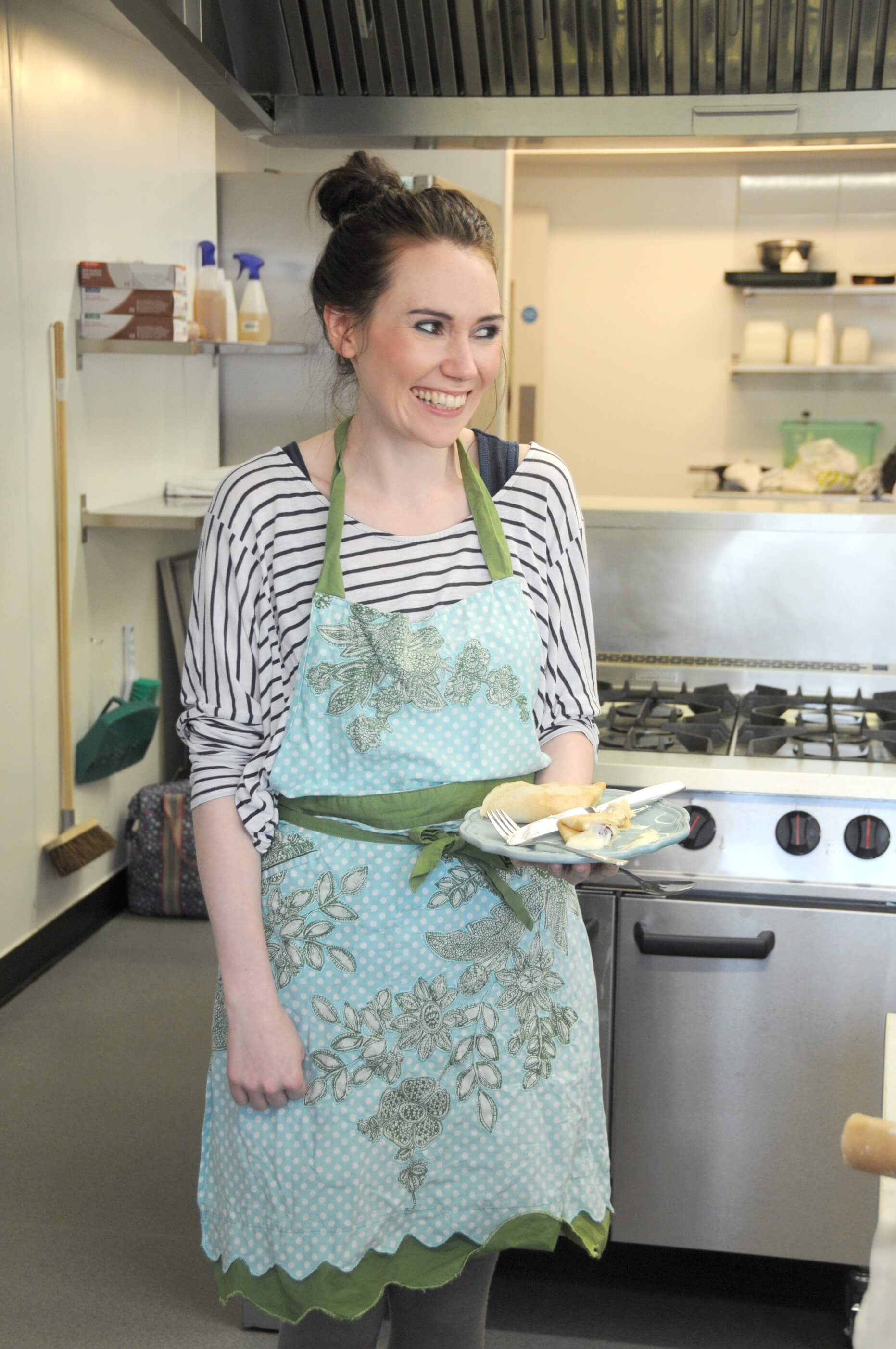IFBC Seattle 2013 – Entrepreneurial Journalism with Mark Briggs – Post Three
It’s time to get down to the nitty-gritty of attending Foodista’s IFBC in Seattle – what did I actually learn and was it worth going?! I’ve already introduced my personal reasons for attending a blog conference all the way over in Seattle and have mentioned some of my first impressions on arrival, including the conference opening and inspirational keynote by Dorie Greenspan. During the rest of the conference, we attended either big group sessions, such as an Amazon.com Grocery live food blogging session (think speed dating but with food products!) or we could chose from a selection of break-out sessions, split into Technology, Writing or Tech or we ate!
I was hoping to wrap up the conference in three posts, but I can see there might be a few more on the way…!
Today, I’ve decided to re-cap one of the sessions I enjoyed the most on the first day of the conference, introducing the concept of Entrepreneurial Journalism, because I think there were some really useful nuggets of advice to be shared and I felt this session was perfectly pitched.
Writing: Entrepreneurial Journalism: Building Your Food Blog Business by Mark Briggs.
This writing session was hosted by Mark Briggs, the Director of Digital Media at KING Broadcasting, author of Entrepreneurial Journalism: How to Build What’s Next for News (UK link, non-affiliate) and co-creator of a new app called Fork. I had already read Mark’s book on my Kindle during the flight to Seattle (in between watching The Great Gatsby!) and I was so pleased I did, since it meant I was already familiar with some of the concepts that Mark mentioned during his session. The main themes were creativity, readership, audience and community and the challenges of knowing – “What is your value?”
First of all, Mark pointed out (and he wasn’t the only one to do so during the conference) that as food bloggers, we seriously undervalue ourselves. We need to be more confident in what we’re asking for and that we should push ourselves to blog with more definition and purpose.
Mark referred to a couple of quotes from Simon Sinek’s TED talk on How Great Leaders Inspire Action, throwing out some of the following questions –
- What’s your purpose?
- What’s your cause?
- What’s your belief?
- Why should anyone care?
People don’t buy what you do – it’s why you do it.
From the very start of the session, we were already being challenged to think about ‘why’ we blog and to think about the people who read our content. If you blog, ask yourself:
Why are you hoping that your readers become part of your community?
Based upon the idea that ‘Creativity is the new literacy’ by Chase Jarvis, Mark also advised us to work on our creativity and to constantly challenge ourselves to think about how we can be more creative.
Creativity is not something that will just happen – we need to work on it, daily.
This was a really interesting concept to me, because the reason I started my blog almost three years ago was to have a creative outlet. Having spent lots of time writing, featuring brands, taking millions of photographs, cooking and building an audience – in many ways, I have achieved what I set out to achieve; I do see my blog as my creative outlet, but it became clearer during this session that I need to become even more creative if I want to build upon what I already have.
Another thing that stayed with me was Mark’s advice to:
Be different. Not better.
Build Your Blog into a Business
Mark highlighted that there are many ways of making money from a blog and that it is possible to turn a blog into a business; for example, you could partner with ad networks or host directly sold ads, be sponsored or become a brand ambassador, set up affiliate links, write sponsored posts, seek out freelance commissions, teach cookery courses, charge for event appearances, create a product or write a cook book, to name a few ways. However, the real key is to create quality content whatever you do:
The better quality, the more influence you have and the better your business prospects.
My understanding was that when you do this, you shift from ‘hobby blogging’ into ‘entrepreneurial journalism’ and then as Mark said: “It’s business time!”
You’re not bloggers. You’re media companies.
If you do find yourself in this situation, then it’s time to re-define yourself – think about setting up as a sole proprietor or in the UK, a sole trader – if you haven’t done so already. Being a blogger is now a completely new business model.
Whatever the situation, you should always have a goal or a vision in mind. Define your mission, evaluate it regularly, ask yourself whether you are heading in the right direction and measure your progress. Here are two questions to keep in mind: “What’s my story?” and “What does my audience think?”
The world is a very malleable place. If you know what you want, and go for it with maximum energy and drive and passion, the world will often reconfigure itself around you much more quickly and easily than you would think – Marc Andreesson
Most bloggers also have the same issues – time. Time management is essential and Mark advised us to: “Make clear choices about what you spend your time on.”
Another angle to Mark’s strategy for food bloggers was to look for people within our own networks, maybe partners or collaborators, who we can work with creatively and “to leverage the cool/smart people in your life.” Perhaps think about making something or creating content that people want, quoting the Holstee Manifesto –
Life is about the people you meet and the things you create with them, so go out and start creating.
And the last bit of advice from Mark? Ask yourself some more questions:
- What is the opportunity?
- Where is the niche?
- Where can a community be formed?
If you’re interested in reading some more of Mark’s ideas, he writes a great blog called Journalism 2.0. Mark’s conference post re-caps some of our Tweets, too and there is also a link to the presentation – Is it a Blog? Or a Business? here.
Bored of writing product reviews? Mark suggested watching ‘Review Wednesdays’ on Daily Grace on You Tube for her take on things!
Want to get noticed? Create some content for You Tube which has more than one billion monthly users.
Final tip – the use of mobile devices to read blog is mushrooming. Make sure your site is mobile responsive or create a mobile version using a site such as Duda Mobile, which will even let you create a logo to use on your home screen.
With thanks to Foodista and Zephyr Adventures for organising the conference. This trip was self-funded and all posts are completely free of any payment, commercial sponsorship or existing brand relationships.
This is post #3 of 3 – attendees were asked to write 3 posts as part of the$95 ticket deal – but there’s still more to come from me!
Post One – Food Blogging Stateside
Post Two – Arrival, Opening and Keynote by Dorie Greenspan
What’s your view on the new landscape in media created by blogging? Do you welcome ‘entrepreneurial journalism’ or should bloggers stick to hobby blogging?





‘ Parenting is a task that requires a lot of patience. Gold is also used in the medical profession for arthritis treatments though it is a medicine of last resort today. So the only real value an ANACS 2009 MS70 Silver Eagle has is its silver value, which is $18.
There’s lots to think about there Ren. Thanks for sharing your experience with us 🙂
Thanks Jac, I loved this session.
Interesting thought provoking stuff here. Thanks for sharing your trip.
Thank you Denise – hopefully I’ll get onto the food at some point soon!
Great recap thanks. I missed this session and it sounded so good. Must look at those slide now.
Thanks Vicky, I’ll also be following Mark’s blog from now.
Wow what an interesting read. I love the bit about being creative and how we should work on it daily. I am with you in that blogging is a creative outlet but it’s also very educational. Think how much we’ve all learned. But it is hard to focus and channel all the creative stuff in the right way. Companies have staff dedicated to this but bloggers have to do it all themselves!
Thanks for sharing such valuable information, I will re-visit your posts regularly. They are so useful 🙂
It’s also incredibly hard! I agree – think of all the skills we’ve amassed through blogging, now just the writing and photography but also all the technical side of running a website. It’s not just a case of writing a post and hitting publish – many hours of work can go into each post. I think if we lose sense of our creativity it can quickly become a chore – and we don’t want that!